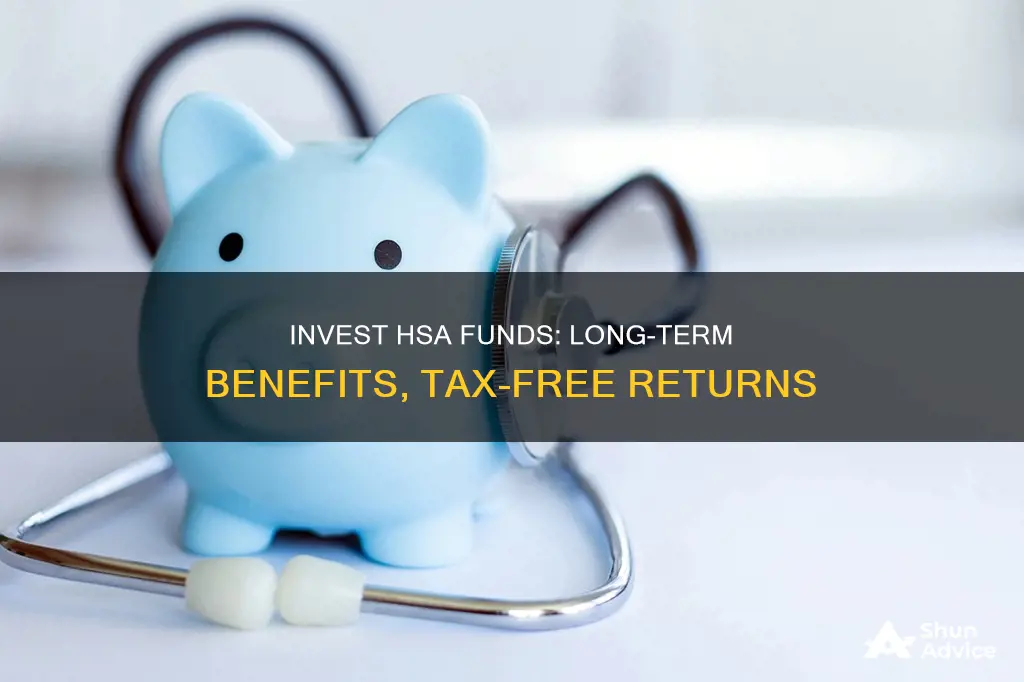
Health savings accounts (HSAs) are a great way to save for future medical expenses or give your retirement funds a boost. HSAs offer a triple tax benefit: contributions are tax-deductible, earnings on the account remain tax-free as long as they are used for qualified medical expenses, and withdrawals for qualified medical expenses are also tax-free. Investing HSA funds is one of the best ways to take advantage of the account, and the longer you invest, the greater your potential growth. You can invest HSA funds in stocks, bonds, mutual funds, ETFs, and more. However, it's important to note that investing involves risk, including the potential loss of principal value, and it's recommended to consult a financial advisor before making any investment decisions.
| Characteristics | Values |
|---|---|
| Tax advantages | Contributions reduce taxable income, money grows tax-free, and withdrawals for qualified expenses aren't taxed |
| Investment options | Stocks, bonds, mutual funds, ETFs, money market funds, dividend funds, individual stocks |
| Accessibility | Funds can be withdrawn at any time to pay for qualified medical expenses |
| Rollover | HSA funds can be rolled over from year to year, unlike FSAs |
| Long-term care | HSA can be used to prepare for long-term care expenses, such as in-home health aides or nursing home costs |
| Retirement | HSA can function similarly to a traditional IRA or 401(k) after age 65, with funds available for any reason |
What You'll Learn

Triple tax advantage
A Health Savings Account (HSA) is a savings vehicle that offers a triple tax advantage, making it a great long-term savings option. Here's how it works:
- Tax-free contributions: HSA contributions are not subject to taxes. This means that every dollar you contribute from your paycheck goes directly into your account without any taxes being withheld. This allows you to maximize the amount you can use for qualified health expenses.
- Tax-free growth: Any interest or earnings on your HSA account are also tax-free. This means that you can grow your funds through interest or investing without incurring taxes. There is no expiration date or required minimum distribution, so you can spend years growing your HSA funds tax-free.
- Tax-free withdrawals: You can make tax-free withdrawals from your HSA account to pay for qualified health expenses. Unlike other tax-advantaged accounts like a 401(k) or IRA, you don't pay taxes on withdrawals as long as they are used for qualified medical expenses.
By offering a triple tax advantage, HSAs can help you prepare for short- and long-term healthcare expenses. They are a great way to save for the future and reduce your tax liability.
The Global Investment Hub: Where Funds Call Home
You may want to see also

Long-term care planning
Long-term care can be one of the most significant expenses a person will face in their lifetime, and many are unprepared for the costs. The good news is that health savings accounts (HSAs) can be used to pay for long-term care insurance premiums, which can help to ease the financial burden.
According to the Health Department, about 7 in 10 people turning 65 can expect to need some form of long-term care services. Without protection, these costs can deplete retirement savings. Long-term care insurance can help, but it is important to note that premiums are cheaper when you are younger and healthier. By the time you are in your 60s and 70s, it may be difficult to qualify and premiums will be more expensive.
One way to save is by using an HSA to cover long-term care premiums. The benefit here is that you can take advantage of the triple tax benefit of an HSA: contributions are pre-tax, interest and investment gains are tax-free, and withdrawals for qualified medical expenses are also tax-free. It is important to note that there is a limit to how much you can withdraw tax-free from your HSA to pay for long-term care insurance, and this limit depends on your age. For example, for those aged 40 and younger, the tax-free limit is $450, while for those 71 and older, the limit is $5,640.
Additionally, long-term care insurance can help shield your home and other family assets against state Medicaid recovery programs. These programs are designed to recoup the costs of long-term care services for individuals who have depleted their assets and are eligible for Medicaid. By having long-term care insurance in place, you can exempt the amount of insurance you have from Medicaid recovery efforts.
While the amount you can contribute to an HSA depends on your policy (individual vs. family), the amount you can withdraw to pay for long-term care is based on your age. For 2023, the contribution limits are $3,850 for self-only coverage and $7,750 for family coverage. For 2024, these limits will increase to $4,150 for individuals and $8,300 for families. Those aged 55 and older can contribute an additional $1,000 as a catch-up contribution.
Mutual Funds: Not a Get-Rich-Quick Scheme
You may want to see also

Investment options
Once you've set up your HSA, you can start investing. Some providers allow you to invest any amount, whereas others require you to meet a minimum balance before you can start investing.
You can invest your HSA funds in a variety of stocks, bonds, and mutual funds. Some providers also offer a robo-advisor option, which selects investments on your behalf based on your risk tolerance and time horizon.
If you keep a small balance in your HSA or plan to use it regularly, low-risk, low-return options such as money market funds may be a good choice. This ensures that your money will be readily available when needed.
For those who don't anticipate many medical expenses in the coming years, investing in stocks may be a good option. However, stocks are volatile, so it's important to keep a portion of your account in cash or money market funds to cover short-term medical costs.
- Index funds: These allow investors to purchase a diversified group of stocks that track indexes like the S&P 500 or Russell 2000. They have low fees, allowing you to keep more of your returns.
- Dividend funds: These funds invest in companies that pay dividends, which are typically established and profitable. Dividends won't be taxed, and you can choose to reinvest or hold them as cash.
- Individual stocks: This is the riskiest option, as it involves investing in a small number of individual stocks. It offers the potential for high returns but also carries a greater risk of loss if your investments don't perform as expected.
If you have a lower risk tolerance or anticipate needing money for medical expenses, short-term bond funds may be a better option. They generate some cash and are relatively stable, so you're less affected by fluctuating interest rates.
It's important to note that investing in securities and mutual funds involves risks, and there is always the potential to lose money. Consult a financial advisor before making any investment decisions to ensure they align with your goals and risk tolerance.
Best Vanguard Funds to Maximize Your 401(k) Returns
You may want to see also

Eligibility and enrolment
To be eligible to open and contribute to a Health Savings Account (HSA), you must meet the following requirements:
- Be covered under a qualifying high-deductible health plan (HDHP) with a minimum annual deductible and a maximum limit on the sum of the annual deductible and out-of-pocket medical expenses.
- Have no other health coverage except what is permitted under specific conditions, such as coverage for liabilities incurred under workers' compensation laws or tort liabilities.
- Not be enrolled in Medicare.
- Not be claimed as a dependent on someone else's tax return.
If you meet these requirements, you can set up an HSA with a qualified trustee, such as a bank, an insurance company, or an IRS-approved trustee of individual retirement arrangements (IRAs). You can enrol through your employer's human resources department or independently through banks, credit unions, and brokerages. There is no minimum required to open an account, and you can invest any amount.
Retirement Mutual Funds: Choosing the Right Investment for Your Future
You may want to see also

HSA vs. FSA
When it comes to choosing between an HSA and an FSA, it's important to understand the differences and how they can benefit you. Both Health Savings Accounts (HSAs) and Flexible Spending Accounts (FSAs) allow you to set aside money before it's taxed to pay for healthcare costs. Withdrawals are also tax-free if used for qualified medical expenses. However, there are some key differences to consider:
Ownership and Portability: HSAs are owned by the individual and can be carried to different employers, while FSAs are associated with the employer and are not portable. This means that if you leave your job, you can take your HSA with you, but you'll forfeit any remaining funds in your FSA.
Eligibility: To be eligible for an HSA, you must be enrolled in a qualified high-deductible health plan. FSA account holders, on the other hand, are not restricted to a certain type of health plan.
Rollover: Unused HSA contributions can be rolled over to the next fiscal year. In contrast, FSA's unspent funds may be subject to rollover limitations or may be forfeited at the end of the year. This is often referred to as the "`use it or lose it`" rule for FSAs.
Availability of Funds: The annual total of an employee's FSA contributions becomes immediately available, while HSA contributions are only available for spending after they are deposited.
Withdrawals: HSA account holders may withdraw funds for non-qualifying medical expenditures, subject to taxes and penalties. FSAs generally do not permit withdrawals for non-qualifying expenditures.
Interest: HSAs pay interest, allowing your money to grow over time. FSA balances do not earn interest.
Contribution Limits: HSAs may offer higher contribution limits compared to FSAs. For 2024, the HSA contribution limit is $4,150 for individual coverage and $8,300 for family coverage. FSA contribution limits are typically lower; for 2024, the maximum contribution is $3,200.
Account Management: With an HSA, you have more control over your account. You can decide how much to contribute and whether to invest your funds. FSAs, on the other hand, are managed by the employer and may have limitations on reimbursement.
When deciding between an HSA and an FSA, consider your personal financial situation, healthcare usage, and the type of benefits and healthcare plans offered by your employer. Both accounts offer tax advantages and can help you save for qualified medical expenses, but HSAs provide more flexibility in terms of ownership, rollover, and investment options.
Vision Fund's WeWork Investment: A Bold, Early Move
You may want to see also







